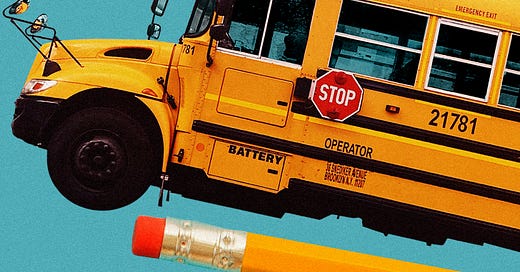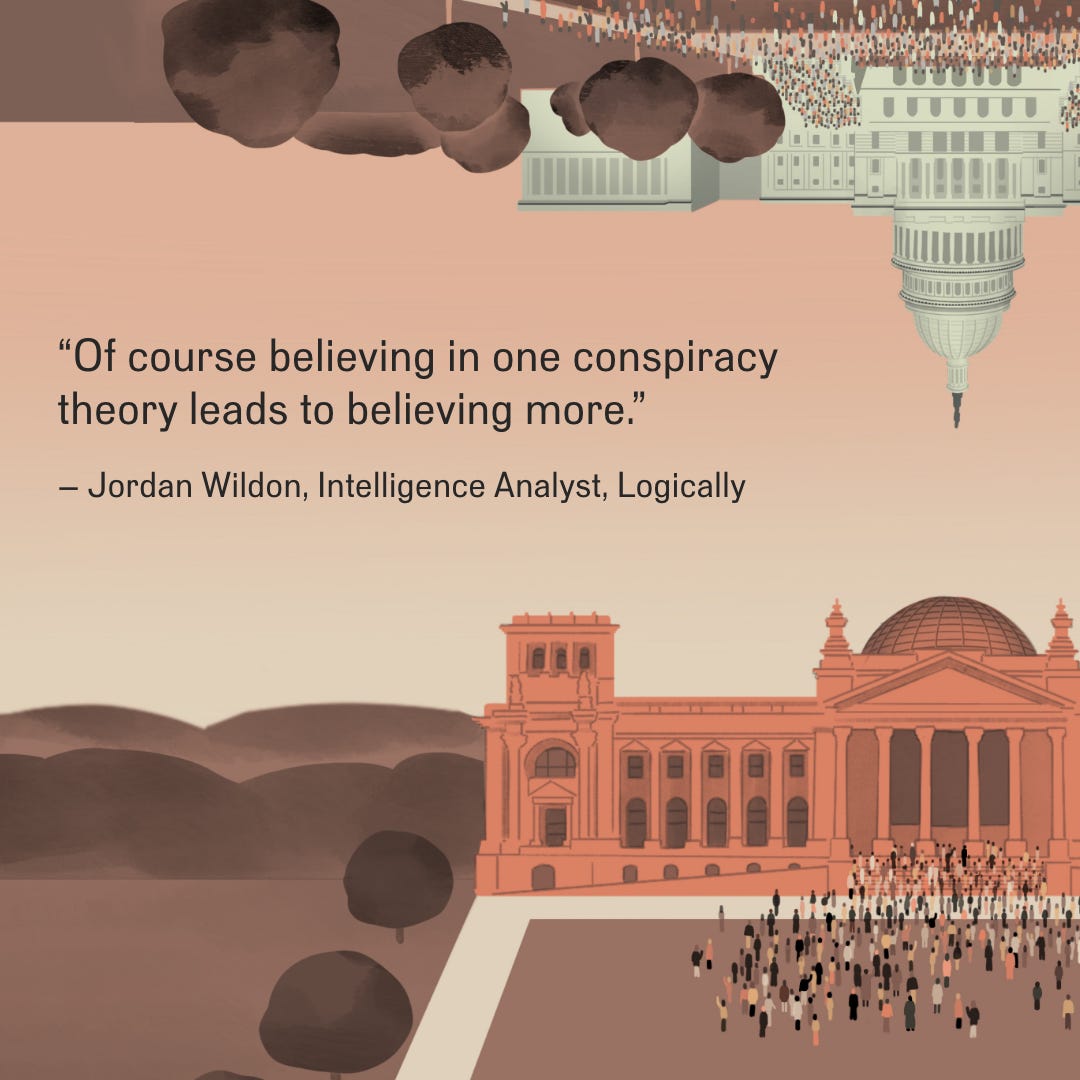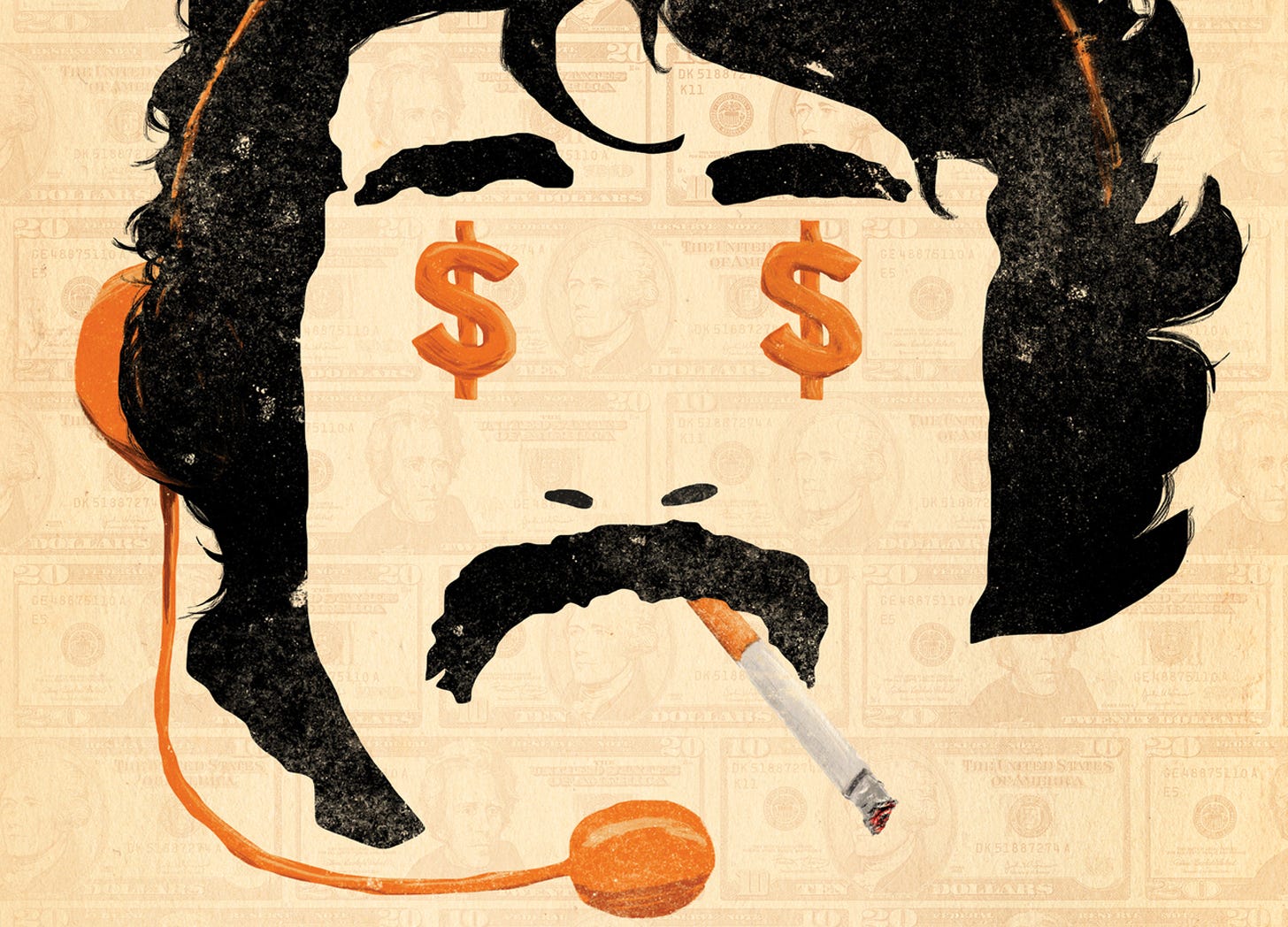Get schooled: Some of our favorite journalism on education
The battle over America's schools, true crime picks, and a look back on a time when the price was *too* right.
Back-to-school brings to mind first-day photos, freshly sharpened pencils, and a new start. As the fall session kicks off, teachers, students, and parents also face slashed budgets, burnt-out educators, and the lasting impact of the COVID-19 pandemic.
It’s also a great time to look back on some recent education-related long-form journalism. From heated debates surrounding homeschooling and public funding to the challenges faced by educators during unprecedented times, these pieces offer a variety of perspectives of the issues at hand and serve as a starting point for reader discussion.
Class starts now, and for extra credit, tell us what we missed. —Parker Molloy
The classroom as ideological battlefield
Educators do much more than teach their students, and after a particularly difficult few years, it’s understandable that many are walking away from the profession. ChalkBeat sheds a light on the stress teachers face in the workplace and talks to those who have quit. Frequently underpaid and underappreciated, 80 now-former educators tell the nonprofit news outlet why they left jobs many had dreamt of doing their entire lives.
In Florida, Gov. Ron DeSantis has made education policies — ranging from the so-called “Don’t Say Gay” law restricting what K-12 teachers can say to the crackdown on how racial issues can be discussed in Advanced Placement courses — one of his top priorities. The DeSantis takeover of New College of Florida, a small public school that has been something of a sanctuary for LGBTQ students and left-leaning causes, is a jarring example of the governor’s attempts to impose his own ideological values on the state’s institutions.
Tampa Bay Times reporter Lane DeGregory spent six months following Amy Reid, a professor of French and the director of the state school’s soon-to-be abolished gender studies program. Reid reflects on the institution she’s dedicated nearly half of her life to and the politically motivated changes forced on students and faculty. In this gripping, humanizing profile, DeGregory chronicles the fear and sadness that Reid and other members of the community felt.
Across the country, schools, teachers, board members, and students are bearing the brunt of a revitalized “parents rights” movement that politicians and conservative media outlets are weaponizing. What began as backlash to COVID-era closures and mask policies has become an all-out assault on race- and gender-related issues. This 2022 Reuters report offers a chilling look at the wrath teachers and school boards faced from angry parents who had been radicalized into the anti-mask, anti-”Critical Race Theory,” and anti-trans moral panics that took root in 2020 and 2021. In a small sampling of districts, Reuters found 220 examples of intimidation and harassment of school staff and officials.
What we lost in the pandemic
It’s easy to forget what an uncertain time the first year of the COVID-19 pandemic was, which is why I recommend scrolling through Education Week’s brilliant timeline of school life during the 2020 and 2021 school years. As much as teachers and school staff who were labeled “essential workers” during the pandemic were lauded in its early days, closures, remote learning, and an ever-shifting set of policies quickly wore on parents, students, and teachers alike.
If there’s one takeaway, it’s that most people were simply trying to do the best they could with the information they had. Even today, there’s no clear answer to what the “right” response to the pandemic should have been, even as political narratives veer from that reality.
We still don’t know what the long term effects of such a tumultuous learning environment will have on those students. In a thought-provoking September 2020 piece, ProPublica’s Alec MacGillis raised concerns that students pushed into remote learning environments may have been “left behind”.
Though it falls short of offering a firm, evidence-backed answer, this story will nevertheless have readers considering the trade-offs that were made during the pandemic.
The war on public schools
Pandemic or not, U.S. public schooling is in a precarious position right now. In the New York Times, Casey Parks brought readers along for a look at America’s rural schools, which tend to be underfunded and understaffed. Students here are often economically disadvantaged and overlooked by the politicians who make funding decisions, leaving them and their teachers stuck making the best of an often bad situation.
In a sense, these schools have been deliberately left to wither on the academic vine in service of a supercharged homeschooling movement that aims to end secular public education and divert its funding to private religious organizations and schools. A recent Washington Post deep dive on the topic profiled Michael Farris, an influential figure in the Christian homeschooling movement and an advocate for the particular brand of parental rights” being championed by conservatives.
While these stories may vary in style, substance, and intended audience, together they are a microcosm of society. At the heart of these stories are questions of what obligations we have to one another, what we’re willing to invest in the future, and what gets the money and attention it deserves. Trade-offs. Risks. Politics. Investment.
You don’t have to be a student, teacher, or parent to appreciate how this ties into our collective lives.
August 29th marked the fourth anniversary of a mob storming the capital. The date’s not a typo. COVID-skeptics stormed Germany’s Reichstag. The event was eerily prescient—if only Americans had been watching. As the U.S. gears up for a 2024 presidential election where misinformation will be a feature, not a bug, it's imperative to learn how it spreads.
Querdenken Everything, by Darren Loucaides with illustrations by Jun Chen, details these networks and how they make people true believers.
“The Contestant Who Outsmarted The Price Is Right” by Chris Jones, Esquire (July 10, 2010)
When news broke that Bob Barker, the longtime host of The Price Is Right, had died at the age of 99, I immediately thought back to this classic Esquire profile of Terry Kniess, who in 2008 became the first contestant ever to guess the exact value of prizes in the Showcase showdown. When the episode aired, host Drew Carey, Barker’s replacement, was criticized for his lack of enthusiasm over the win. (Carey sensed, correctly, that something was up.)
By contrast, Jones writes, “Bob Barker would have made Terry Kniess into the greatest contestant in television-game-show history. Terry Kniess would have been anointed. ‘Oh, I would have run with that, you bet,’ Barker says today from his happy retirement.”
RIP, Bob. —Mark Yarm
Happy September! August has always been a slowwww month in media land, but there have been some great new things to read, watch, and listen to since our last newsletter.
Two of Mark Yarm’s picks are true crime stories. One, the Max docu-series Telemarketers, is a tragicomedy; the other, the Serial podcast The Retrievals, is just plain tragic. For something completely different, Insider veers from its typical business focus to bring us one of the most compelling profiles we’ve read in a minute.
Telemarketers, streaming now on Max
This three-part documentary series, executive produced by the Safdie brothers (Uncut Gems), centers on the misadventures of Sam Lipman-Stern and Patrick J. Pespas, two friends who met in the early 1990s while making calls for a corrupt telemarketing firm, Civic Development Group.
It was the kind of place that would employ Lipman-Stern, a then 14-year-old high school dropout, and Pespas, an ex-con who snorted heroin on the job. The two can’t seem to shake CDG, even after it’s shut down by the Federal Trade Commission, and for years they continued to investigate the sketchy-as-hell telemarketing industry. The fruits of their citizen journalism are both dispiriting and hilarious.
“How Merve Emre became the hottest — and most reviled — name in literary criticism” by Anna Silman, Insider (Aug. 24, 2023)
“I’ve read your profiles,” the prominent 37-year-old literary critic and Wesleyan professor Merve Emre tells writer Anna Silman at one point in this feature. “You’re very good at letting people hang themselves by their own rope.” This piece, which is full of such meta-moments, has much to recommend it: the entertaining tension between subject and writer, some delightfully oddball personal details (Emre wears her husband’s contact lenses?), and a few really catty quotes from anonymous detractors.
The Retrievals from Serial Productions and the New York Times, available now on all major podcast outlets
In five compelling episodes, this podcast explores a horrific recent case at Yale Fertility Center in New Haven, Connecticut. A nurse named Donna Monticone stole fentanyl from work to feed an addiction, and to cover her tracks, Monticone replaced the drug with saline. The switch caused excruciating pain for numerous women undergoing egg-retrieval procedures.
With the utmost empathy, host Susan Burton, a longtime staffer at This American Life and the author of the memoir Empty, examines from multiple angles how women’s pain is “tolerated, interpreted, accounted for, or minimized.”
Thanks for reading this week, and if you’ve made it this far, here’s a bonus recommendation from Heather Muse, Long Lead’s audience development director.
Filmmaker Frederick Wiseman is known for his documentaries about public institutions, with an approach that eschews voice-over and title cards. Instead, he makes the viewer a silent observer of the inner workings of a single hospital, public housing project, luxury department store, and other spaces.
Parker’s roundup of education journalism made me think of Wiseman’s 1968 film, High School, which — spoiler alert — chronicles the day to day of Northeast High School in Philadelphia in the late 1960s.
The 90-minute documentary was controversial in its day for what film critic Barry Grant calls its “scathing portrayal” of public education that “emphasize[d] depersonalization and ideological indoctrination.”
Because of an agreement between Wiseman and the Philadelphia School Board, High School was banned from playing within a certain radius of the city for many years. The National Film Board inducted it into its registry in 1991. It wasn’t until 2001, when PBS aired the documentary as part of its POV series, that it was shown in Philadelphia.
Wiseman made a sequel, High School II, in 1994. It was a sprawling, 3 hour-and-40-minute look at an alternative high school in Spanish Harlem.
Both High School films illustrate that the ideological battle for U.S. public education has been raging for years, and these issues aren’t new, they’re just dressed in contemporary clothing.—Heather Muse
High School and High School II are both available for streaming on Kanopy.










